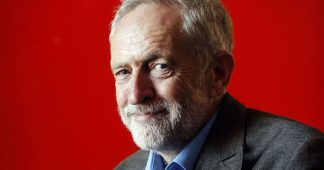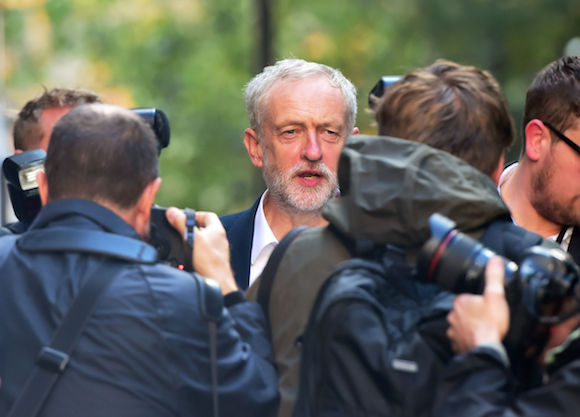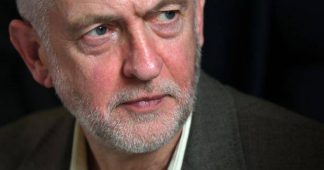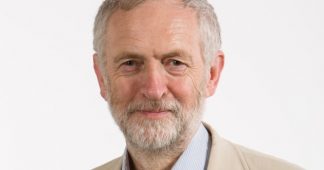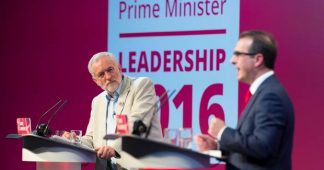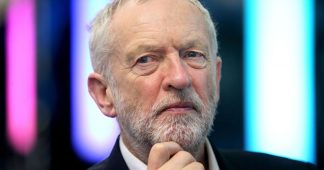Military coup against a Corbyn Labour government discussed by Daily Telegraph
By Robert Stevens
15 May 2018
On May 8, the Daily Telegraph asked, “Could an Army coup remove Jeremy Corbyn—just as it almost toppled Harold Wilson?”
Written by Paul Carter for the de facto house organ of the Conservative Party, the article makes clear that discussions on such a course of action in the event of a Labour victory under Corbyn are ongoing.
The article begins by noting, “Only one week after Jeremy Corbyn’s election as Labour leader, a serving general of the Army warned of a direct and public challenge if a future Prime Minister Corbyn jeopardised the country’s security: ‘The army wouldn’t stand for it … people would use whatever means possible, fair or foul, to prevent that.’”
Carter refers to an article published by the Sunday Times in September 2015, after Corbyn had routed his Blairite leadership opponent with the backing of hundreds of thousands of Labour members and supporters. The newspaper cited an anonymous “senior serving general” that in the event of Corbyn becoming prime minister, there would be “the very real prospect” of “a mutiny.” Elements within the military would be prepared to use “whatever means possible, fair or foul,” the officer declared. He warned, “ You would see a major break in convention with senior generals directly and publicly challenging Corbyn over vital important policy decisions such as Trident , pulling out of NATO and any plans to emasculate and shrink the size of the armed forces.”
The Sunday Times said that the general “served in Northern Ireland in the 1980s and 1990s.”
At the time, a Ministry of Defence source said that it was unacceptable for a serving officer to make political comments about a potential “future government,” but rejected mounting any investigation, claiming there were too many generals to investigate. As the World Socialist Web Site noted, there are only around 100 generals currently serving in the British Army, and not all of them served in Northern Ireland during the 1980s and 1990s.
Moreover, the week prior to the interview the then Chief of Defence Staff, Sir Nicholas Houghton, spoke before the military think tank Chatham House of the “worrying constraints” of parliamentary consent that led MPs to reject military intervention following the Iraq debacle. Houghton was a company commander in, and commanding officer of, the 1st Battalion in the Mechanised and Air Mobile Roles and, in Northern Ireland, commanded the 39th Infantry Brigade in Belfast during the period leading up to the 1998 Good Friday Agreement.
The following November, asked by the BBC’s Andrew Marr about Corbyn’s statement that he would never authorise the use of nuclear weapons, Houghton replied, “Well, it would worry me if that thought was translated into power.”
Carter raises none of this, but notes, “The idea of a military coup against an elected Prime Minister Corbyn may seem fanciful. Yet, fifty years ago this week, this almost happened to [Labour’s] Harold Wilson, a prime minister regarded by many as Left-wing and anti-establishment, who had also been accused of consorting with communist spies.”
He reports that on May 8, 1968, Earl Mountbatten of Burma, a member of the Royal Family and the great-grandson of Queen Victoria, held a meeting at his London home attended by “Cecil King, Chairman of the International Publishing Corporation, which owned the Daily Mirror; its editor, Hugh Cudlipp; and at Mountbatten’s invitation, his longstanding friend, Sir Solly Zuckerman, the Government’s Chief Scientific Adviser…
“Astonishingly, the-68-year-old Mountbatten was invited by King to head up a government of national emergency, whereby certain members of the armed forces, businessmen and other City figures would take over and replace the unpopular and mistrusted Wilson and his cabinet. So, could history repeat itself under a Jeremy Corbyn premiership?”
Carter then proceeds to rewrite history to diminish the significance of what happened in the late 1960s and early 1970s. His message is that a coup against Wilson was not carried out then and that there is even less chance of a coup against Corbyn today.
He writes, “The so-called military coup of 1968 faded and failed and was blamed on a ‘pretty loony crew’ motivated by ‘loose talk from gin-sodden generals.” However, King’s apocalyptic vision of Britain’s economic breakdown did not occur—democracy was allowed to run its course.”
Democratic rule was not allowed to merely “run its course” at all. There were ongoing discussions of a coup for years after the events cited by Carter.
The years from 1968 to 1975 were characterised by an acute crisis for British and world capitalism that posed the threat of socialist revolution. The Mountbatten meeting took place just six days after the beginning of the May–June 1968 events in France, which culminated in a general strike of over 10 million workers—the largest and most extended in history, with red flags flown over factories and President General Charles De Gaulle leaving the country.
The ultimate concern of the coup plotters was not Wilson, or the Labour Party, but the challenge posed by an increasingly combative working class.
From 1970 to 1974, the period when Conservative Prime Minister Edward Heath was in power, senior UK intelligence and military figures repeatedly discussed a military coup.
Heath’s period in office saw the greatest eruption of industrial action since the 1926 General Strike, and his calling of no less than five states of national emergency. During the seven-week-long miners’ strike in 1972, plans for a scab transport force were laid involving 600 drivers to be organised from a Royal Airforce Base. Afterwards, the COBRA national emergency cabinet committee was established. This came to a head in 1974 in a second miners’ strike, during which Heath placed responsibility for emergency powers under the control of the Civil Contingencies Unit. The police and the Ministry of Defence were secretly placed on an alert procedure and military manoeuvres were carried out at Heathrow airport and other strategic locations.
Heath called a general election for February 28, 1974, under the slogan, “Who runs Britain, the government or the unions?” Despite government threats and a vicious media witch-hunt, the miners stayed out on strike for the duration of the election campaign. As a result, Heath failed to secure a majority but refused to leave Number 10 for four days, during which time the then-chief of the Defence Staff, Lord Carver, admitted that discussions about military intervention had taken place among “fairly senior officers.”
In the end, the ruling elite decided to entrust a Labour government with stabilising the situation. But even then, continual plots were hatched against Wilson and he was smeared as a Soviet agent—just as Corbyn has been denounced as a stooge of the Czechoslovakian Stalinist regime during the 1980s.
Within two years of Wilson taking office in 1974, his opponents in ruling circles and the military had engineered his removal under conditions in which military operations were still taking place in Whitehall that were visible from Downing Street itself. His replacement, James Callaghan, was a trusted figure in ruling circles, who had served as the parliamentary adviser to the Police Federation . These events were the subject of a BBC documentary, “The Plot against Harold Wilson,” in 2006, which included interviews with Wilson and his private secretary from the 1950s, Marcia Williams, now Baroness Falkender.
Segments of taped discussions with BBC journalists Barry Penrose and Roger Courtiour, given to them by Wilson and Williams shortly after he resigned, were aired. Williams recalled of the airport operation, “I still believe that operation they mounted at the airport … was a rehearsal, nothing more. There was all the terrific mobilisation, the alert was on, there was—all through Whitehall—along the airport road, up and down, landing and getting out.”
In the 1970s, the only political tendency that sought to warn the working class of the dangers posed to the working class were the Socialist Labour League and its successor organisation, the Workers Revolutionary Party—then the British section of the International Committee of the Fourth International.
Dismissed as political paranoia by the pseudo-left groups, the ruling elite took these exposures seriously. In a House of Lords debate on “subversive and extremist elements,” held in February 1975, with the moves against the Wilson government in full swing, Lord Chalfont noted, “At the last Election, one of the candidates was a prominent member of the Workers’ Revolutionary Party. Miss Vanessa Redgrave, who claimed that the Government were preparing concentration camps in Britain and that the Army was being prepared to repress the workers in Great Britain as it had done in Northern Ireland.”
In the same debate, the Earl of Kimberley stated that the “Workers’ Revolutionary Party or the Socialist Labour League, must not be dismissed as just another fringe movement. It is by far the most dangerous of the Trotskyist organisations in this country. It is larger, better organised, and, from the point of view of industrial agitation, more intelligently led than its rivals.”
If anything, the danger of a military coup is greater today than it was in the 1970s. And once again, only the International Committee of the Fourth International seeks to warn the working class of what is threatened.
The fact that a military coup is again under serious consideration puts paid to the illusions assiduously cultivated by Corbyn and his apologists that a Labour government led by him will inaugurate a new period of reforms. The numerous interventions by leading armed forces personnel demonstrate that no such reforms, let alone a more pacifist military policy, will be tolerated. In March, for example, the Times gave substantial coverage to demands by military leaders for a “strategic surge” in defence spending, with the Times editorialising against the “pernicious idea that defence spending is a mere footnote to the chunky health and welfare budgets.”
In 2016, in its congress resolution, “Jeremy Corbyn and the Labour Party: The strategic lessons,” the Socialist Equality Party explained:
“These threats mark a milestone in the degeneration of British democracy. As someone involved in politics throughout the 1970s, at a time of rising industrial militancy that culminated in the bringing down of the Conservative government of Edward Heath in 1974, Corbyn is well aware of their implications. This was the period in which the civil service, the police and the Ministry of Defence were secretly placed on alert and military manoeuvres were carried out at Heathrow airport and other strategic locations. Moreover, he is of a generation for whom the 1973 CIA-backed coup against the Chilean government of Salvador Allende was a formative experience. But rather than alerting the working class and insisting on Houghton’s removal, Corbyn sent a polite letter to Defence Secretary Michael Fallon stating, ‘It is essential in a democracy that the military remains politically neutral at all times.’”
Corbyn lists Allende as one of his heroes.
Another warning arises from the Telegraph article. One of Carter’s more significant observations regarding a possible coup is when he asks, “Even assuming a plausible unelected leader was found … would they really want to challenge Corbyn’s 1.4 million Facebook followers with a depleted army of less than 80,000 soldiers?…
“In 1968, talk amongst some army officers was that Wilson would be held at the Tower of London, with the Shetland Islands designated an internment camp for up to 5,000 Left-wing and trade union detainees. A lack of social media and mobile phones makes such a round-up easy.”
This comment is telling. Masses of often young people, who are offered no future except social misery and war, have turned to social media to discuss ways of fighting back. Under the guise of combating “fake news” and Russian meddling, the ruling class is intent on censoring, restricting and even shutting down social media services.
Carter’s statements confirm that through such measures, the ruling elite are actively preparing for the brutal suppression of social opposition. The call by the WSWS for the formation of an International Coalition of Socialist, Anti-War and Progressive Websites in defence of free speech and democratic rights seeks to mobilise the working class in a political struggle against this.
